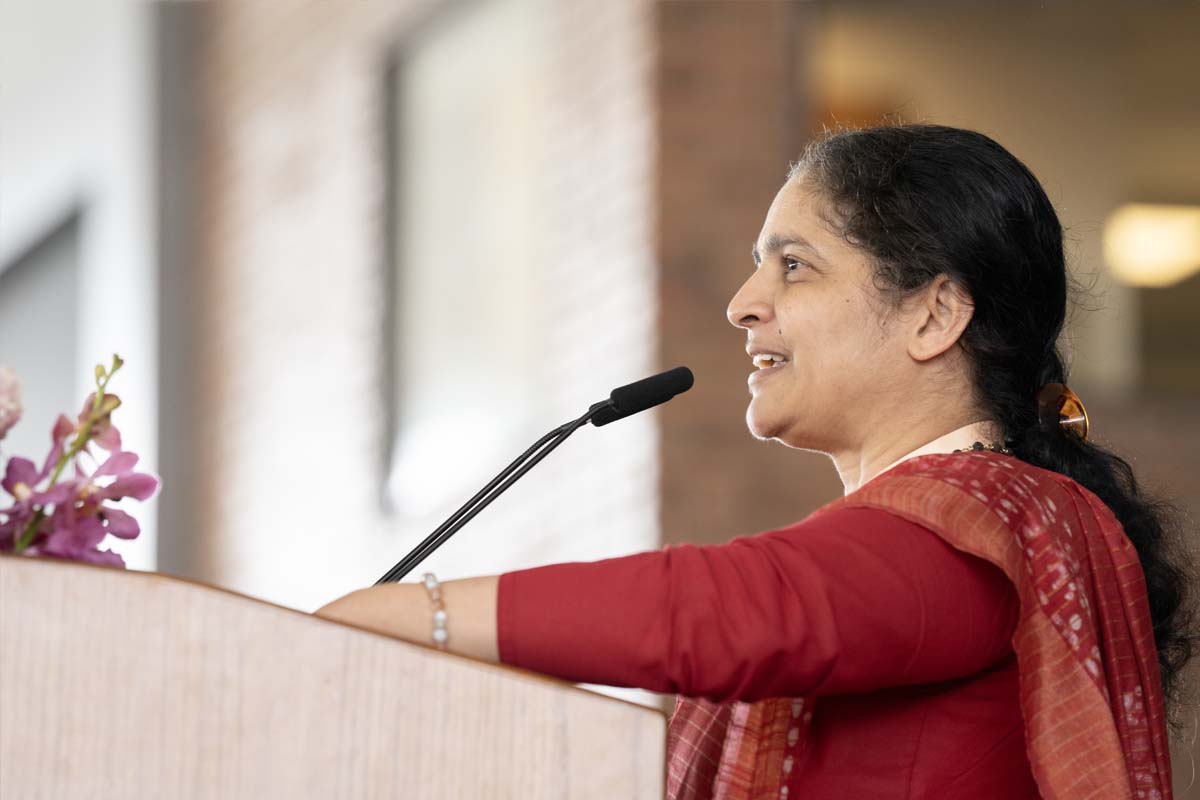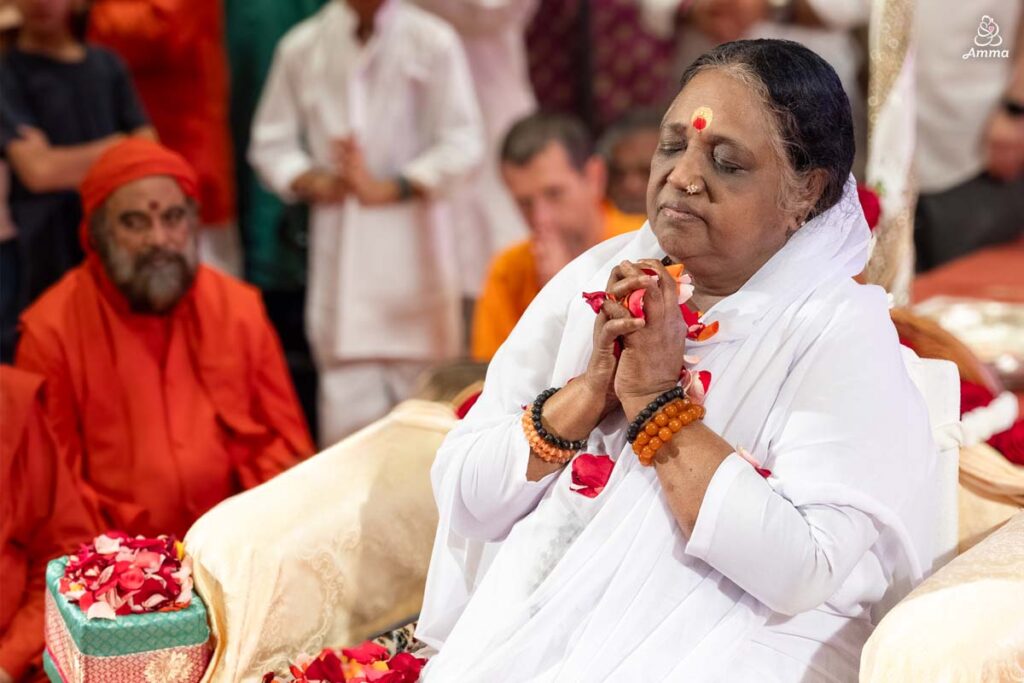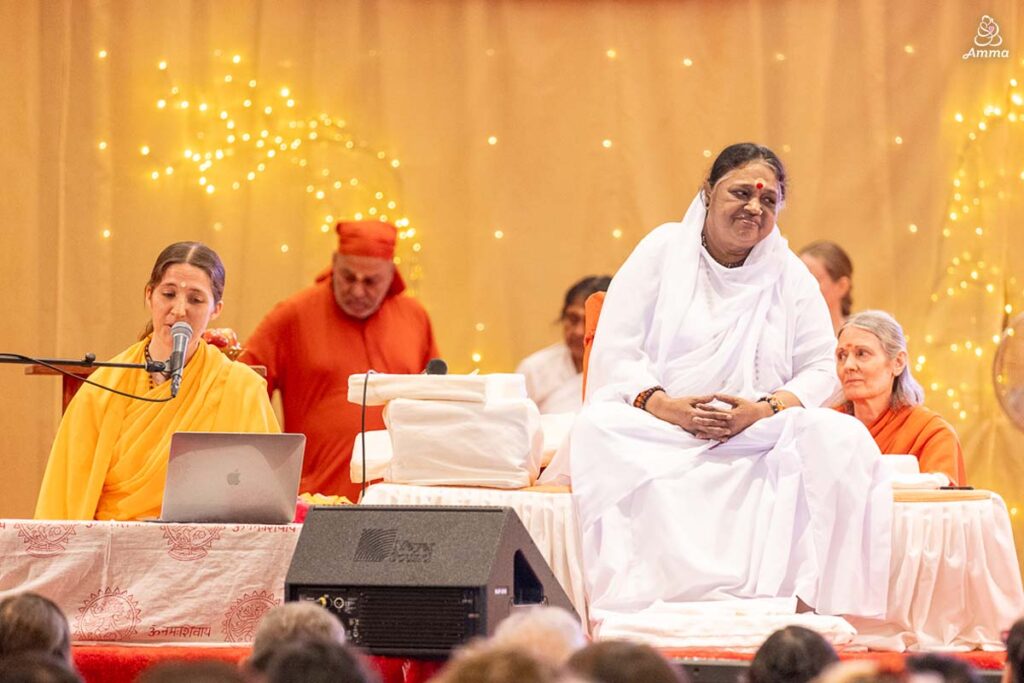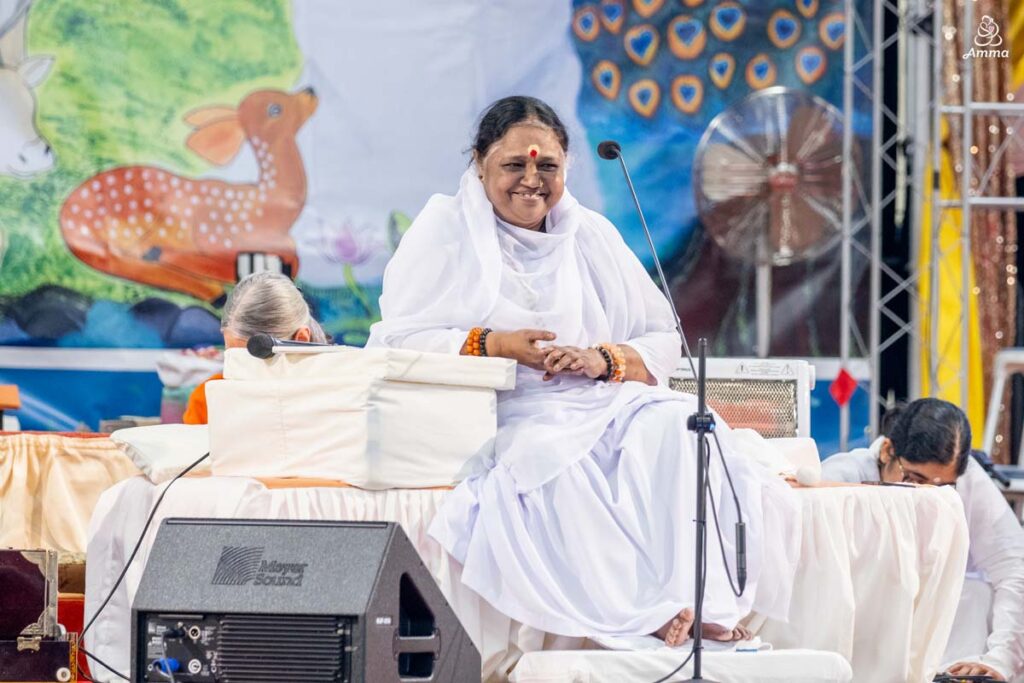Amma shared that spiritual love is the only way to heal the hearts of the world and its people. Amma’s video message was part of the Govt of Bharat’s Global Spirituality Mahotsav. She said that events such as this can play a significant role in achieving a much needed spiritual awakening.
Prof Bhavani Rao is the Dean of Amrita University’s School of Social & Behavioural Sciences and the UNESCO Chair in Women’s Empowerment & Gender Equality. She represented Amma and delivered an address with the theme that spirituality and life are inseparable and based upon compassion.
The Ministry of Culture organised the event, a first of its kind spiritual gathering based upon the theme from inner peace to world peace. The Mahotsav took place in Hyderabad, Telangana, March 14-17. More than 300 leaders from diverse faiths participated and people from over 100 countries joined in.
Amma’s Message
Amma bows down to all of you who are the embodiments of Pure Love and the True Self.
May there be peace on every corner of the Earth. May everyone’s stomach be full and may everyone have a roof over his head. Let there be goodness, health, happiness, peace and abundance for everyone. May Mother Nature forgive our mistakes and bless us with a time in which there are no natural disasters.
Maybe you think such prayers are unrealistic. But it is through dreams like these that we learn the direction our life should take and where we should put in effort. Every journey starts with one small step. Each of us can create small positive changes in our life. If we can all do this, it will mark the beginning of a new age.
For positive change to come, we need to put in proper focused effort in the right direction. Life always presents us with two paths. One is an easy shortcut to quickly fulfill our desires. The second is the proper path to attain them.
The first path is unreal. It just appears to be there, like a mirage. It is, in fact, the path to death.
The second path, on the other hand, is the path of dharma; it leads us to immortality. We should be able to transcend our personal desires and sacrifice them for the greater good of society and the world. To do so is a great thing.
If this attitude were nurtured in people, many of the world’s problems could be quickly solved. Global issues such as poverty, global warming, and climate change could be fixed.
Life is like sitting in an examination hall. Every moment is precious. Our success and failure are determined by how well we use our allotted time.
Let us sow good thoughts and reap good actions. Let us sow good actions and reap good habits. From good habits and behaviour, we can build a beautiful life. Through living a good life, we can rewrite our destiny.
In order to make our thoughts and actions good, we should remain alert and attentive. With genuine and sincere effort, we can change any bad habit. The strength, courage and goodness to overcome difficult situations is inherent within each of us. We need to awaken them.
If we have a heart that doesn’t lose hope and a mind that is always cheerful, we will be able to see newness and find happiness in everything. If along with these qualities we are able to be loving, friendly, and content, there can be no greater cause for celebration.
Events such as the Global Spirituality Mahotsav platform can play a signficant role in achieving much needed spiritual awakening. In the face of numerous challenges, it is essential to recognise that spiritual wealth is the only way to heal the hearts of the world and its people.
Amma prays to the Paramatman for the success of the Global Spirituality Mahotsav. May the event and the various activities help elevate society’s spiritual growth. May all of you become messengers of love and peace in this world. May grace fill your lives with peace and happiness.
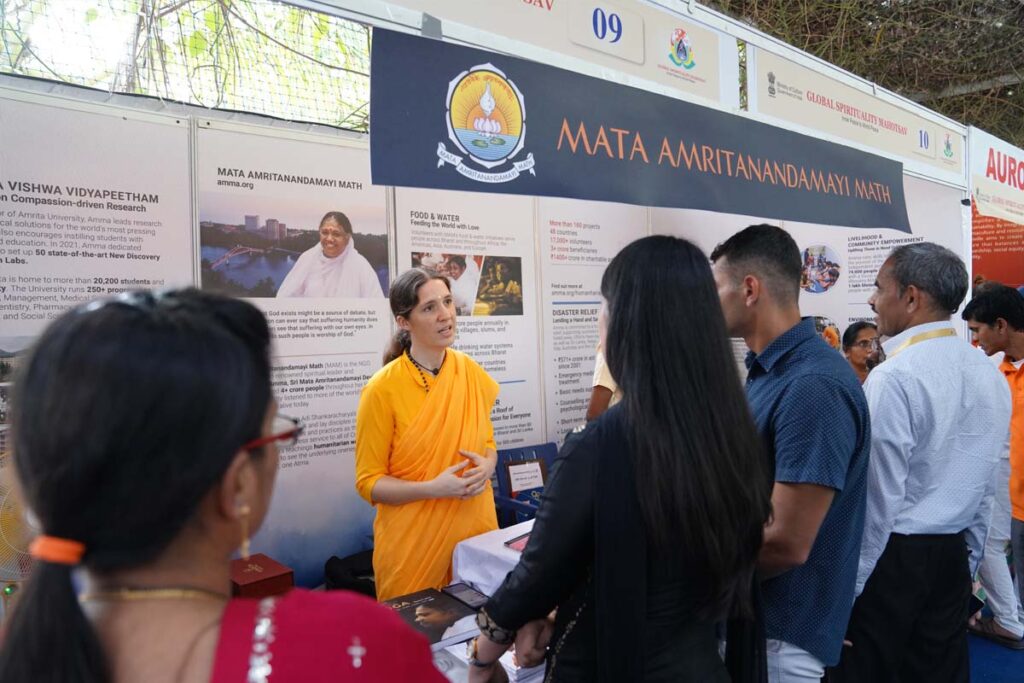
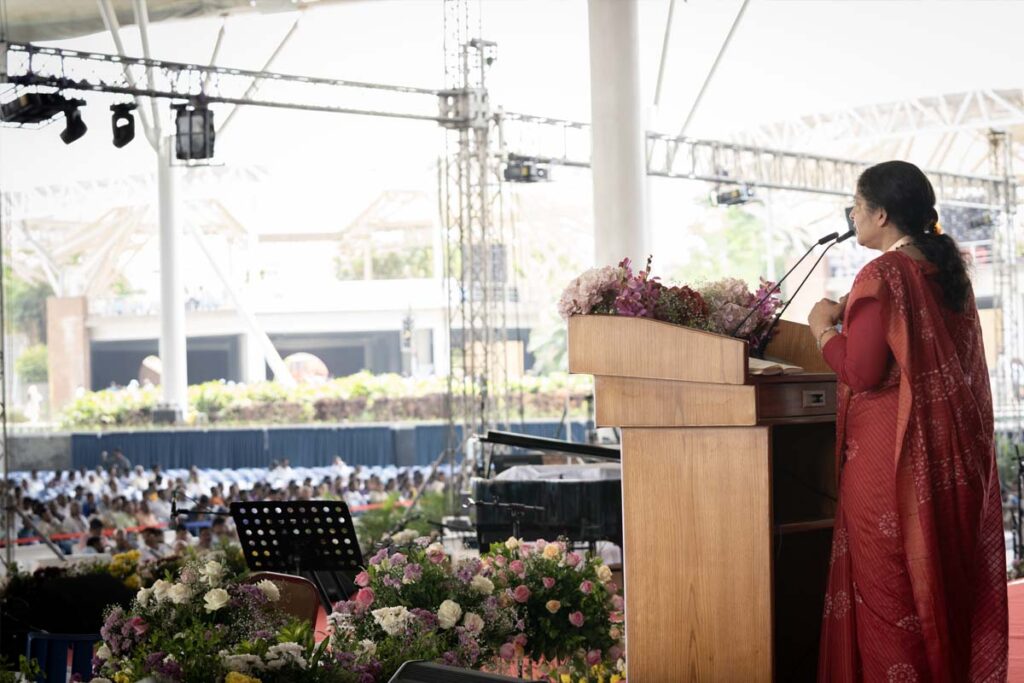
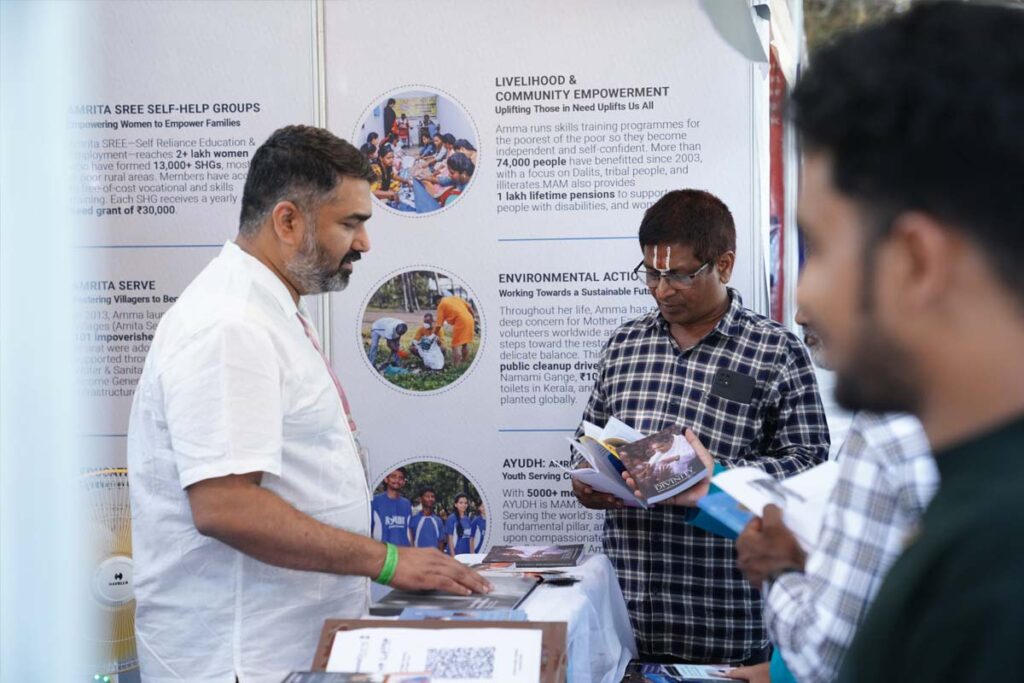
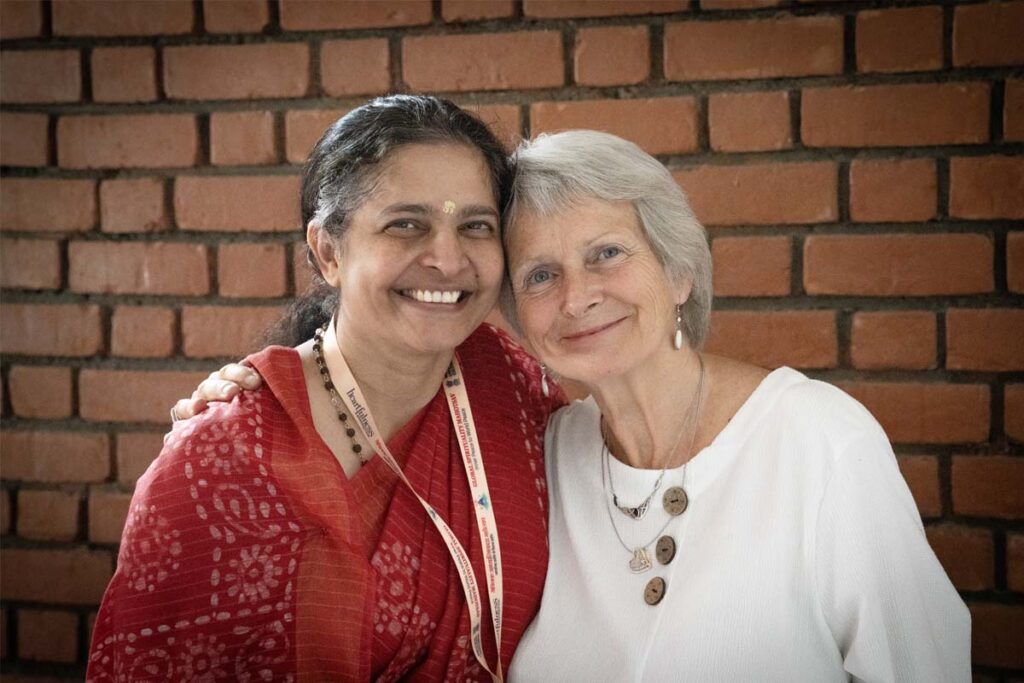
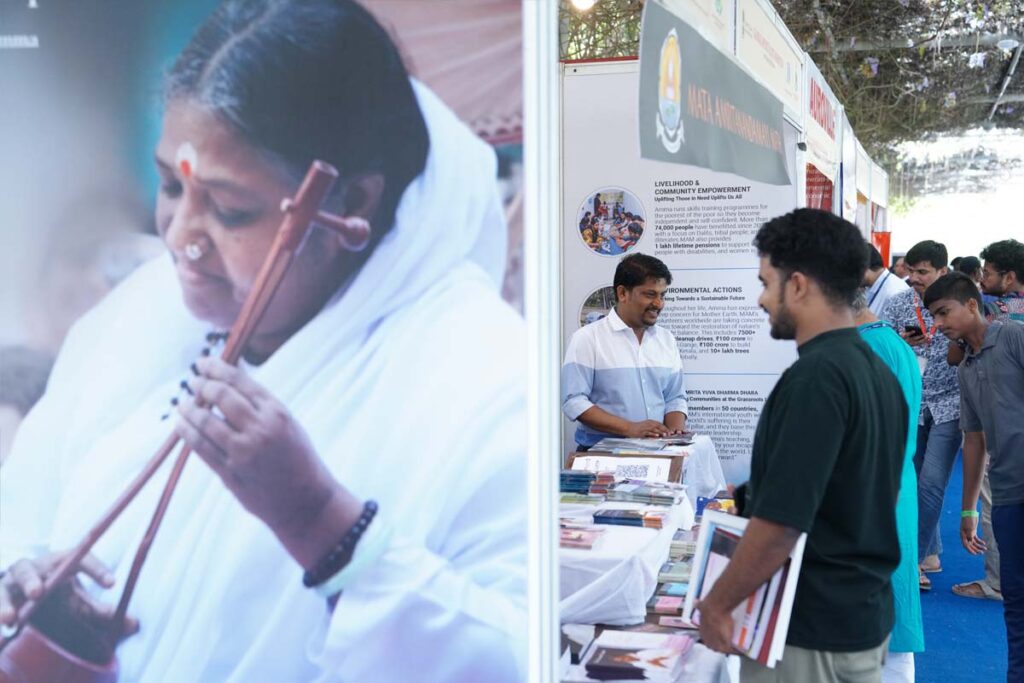
Prof Rao’s address
Spirituality and life are actually inseparable. As Amma says, they are two sides of the same coin. Amma is a wonderful example of how you can integrate spirituality and life. She embraces everyone, irrespective of their caste, their creed, their colour, their economic status, their education status. And that forms the inspiration for me to understand how to blend spirituality and life.
It’s not just her embrace. All of Amma’s initiatives have that infusion of spirituality, whether it’s the educational institutions, the humanitarian work, environmental protection, science & research—everything has an element of spirituality.
Amma says that spirituality begins and ends with compassion. And in Sanatana Dharma, we know that creation and Creator are not two, but one. Creation is verily the manifest form of the Creator. Therefore, we must love and serve all by seeing the Creator in all things.
As Amma also says, to not serve others and to serve oneself, is not life. It is death. And therefore, for us to have this love and compassion is the quintessential way forward to integrating spirituality into life.
How do we do that? I can share with you the example that we have at Amrita University. Amrita as a University is built upon two fundamental principles. One is that we have compassion-based research.
Next is we have two kinds of education: education for a living and education for life. You may ask what this difference is. Education for a living is the kind of education that earns you your bread and butter, puts a roof over your head, gives you good clothes for your body, a vehicle to drive. Education for life is love, compassion, and kindness and all the other positive traits that will help you lead a better life. It is spirituality in life.
Amma also says there are two kinds of poverty. One is the lack of food, clothing, and shelter. The second kind of poverty is the lack of love and compassion. When you deal with the second kind of poverty first, you automatically deal with the first kind of poverty. Because if you have love and compassion, then you will spontaneously serve those who do not have food, clothing, and shelter.
That is why the education at Amrita has this two-fold approach, both for a living and for life. And within the education for life, at its core, are the values of compassion.
How do we implement this? We have a very unique programme at Amrita called Live-in-Labs. All faculty and students at Amrita are given the opportunity to spend time in villages across India. Working with the people in the villages to codesign interventions to their problems.
Now what does this do? One. We do have effective interventions that come. This is the compassion-based research. For example, Chemical Engineering students got together with the Electronics and Communication Engineering students. They built a new model of solar distillation for villages where lemongrass was growing wild. The villagers could distill the lemongrass and create lemongrass oil. That becomes their income. So it’s a very practical way of improving economic vitality by using natural resources.
But what does it do for the students? Gratitude. They see how villagers live with such little resources and how they still manage to be happy. With that comes a very important lesson. Happiness is a decision. Amma says that whether you laugh or cry, your life will pass by. You might as well be happy instead of sad. This is based on gratitude.
Second is respect. You will find that people in the villages can be very strong. The women in the villages are much stronger than I am. They can stand for longer hours. They work in the sun. They have much better mental resilience than I have. So, you also learn to respect people.
These experiences in the villages definitely support developing empathy and compassion. These are the kinds of values based on education for life that we are able to bring into the students at Amrita through Live-in-Labs.
You need not be wealthy or in a high position in order to console the suffering. A loving word, a compassionate glance, a helping hand – that’s enough to help someone.
Amma
I can put it all into a sutra form from our traditions. The Lalitha Sahasranamam, shloka 659, extolls Devi as om iccha shakti jnana shakti kriya shakti svarupinye namah. What does that mean?
Iccha shakti is the power behind motivation, what makes us act. That is at the depth of our intention. This iccha shakti has to be driven by compassion. What motivates us must be compassion.
An example from Amma’s life. She was born into a fishing community, and girls are not supposed to touch boats that go into the sea. It is considered taboo. It is the social, political, and religious culture of that particular community.
However, one day when Amma was a young girl, she found an old lady crying. When Amma asked her why, it was because she couldn’t get across to feed her family with the groceries she had just bought.
Being poor, the children were already hungry when she left. But she couldn’t get back home, because the government boatmen had gone for lunch. She was crying at the edge saying, “What am I going to do? I won’t be able to go across and make food!”
Amma was moved by compassion. She picked up the pole to move this big boat, even though she had never done it before. Amma was just a small girl and the pole was very heavy, but she said, “I’ll take you across. You come.”
Amma took the grandma and rowed the boat across the backwaters. Crowds gathered on both sides, and everyone was petrified because this little girl was rowing where line boats pass and big waves come. Everybody was so worried.
But Amma managed to get the boat across, and as soon as she got ashore, from both sides, there was thunderous applause.
She was motivated by compassion. She was not motivated by rebellion. She was not motivated by activism. She was not trying to right a social injustice. She was motivated by compassion. Compassion makes the essence of all our actions correct.
The second is jnana shakti—knowledge. What kind of knowledge are we talking about? Two kinds of knowledge. One is scientific knowledge. Hardcore facts. Scientific facts. Data. We know how important data is in our life.
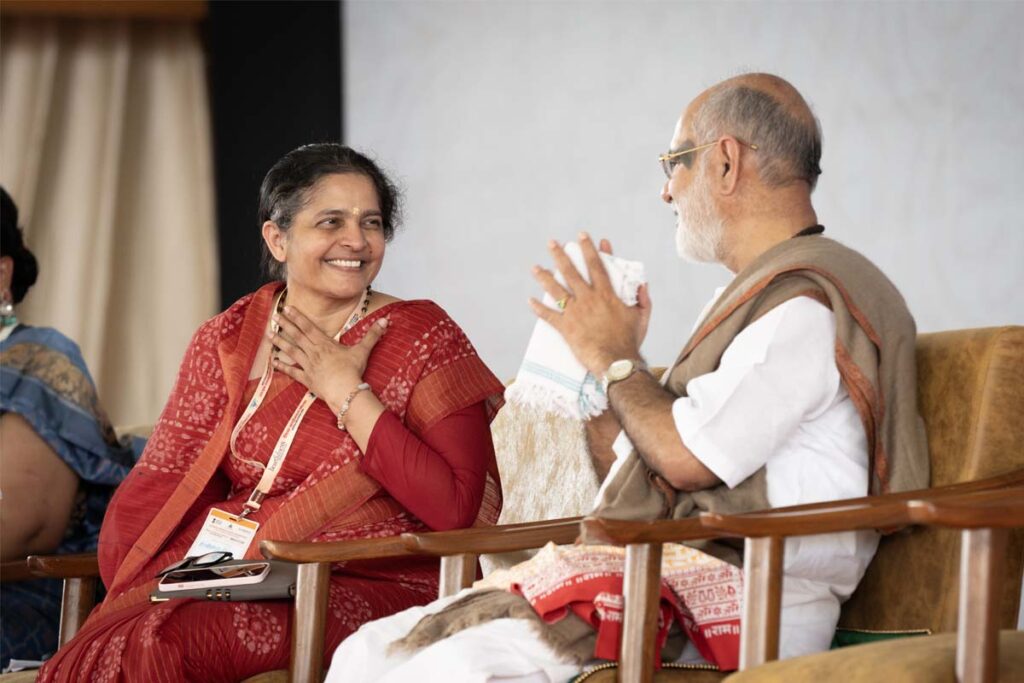
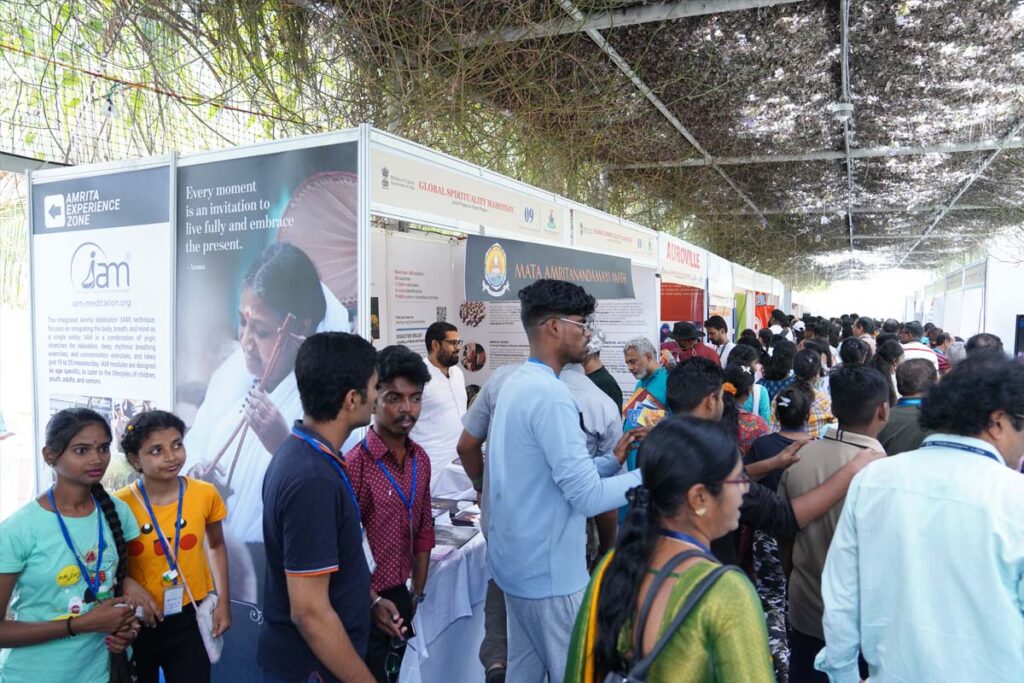
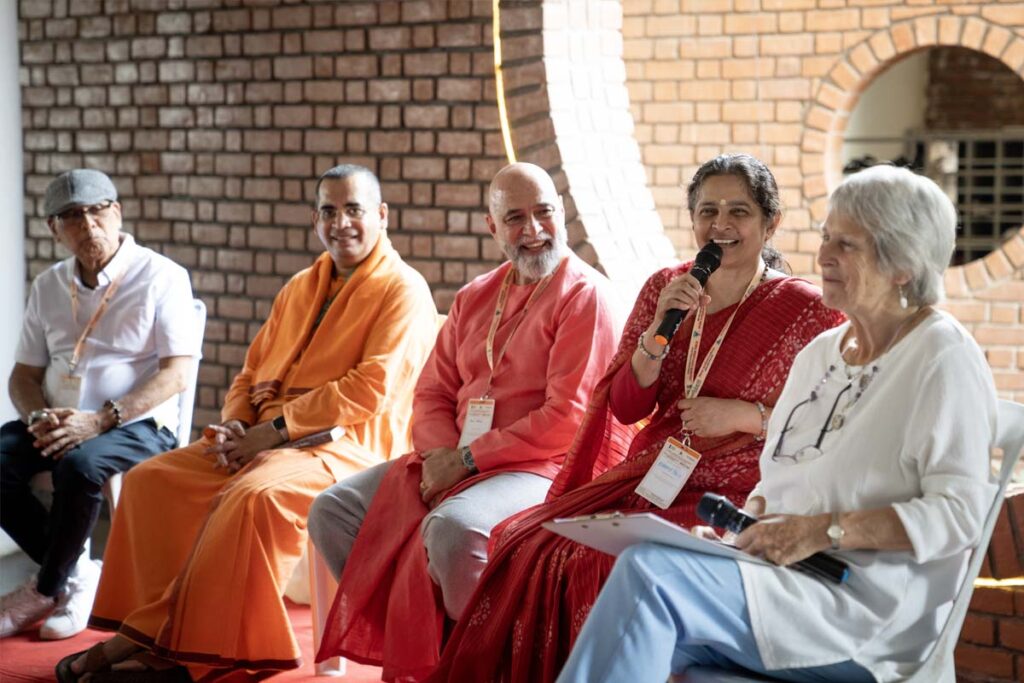
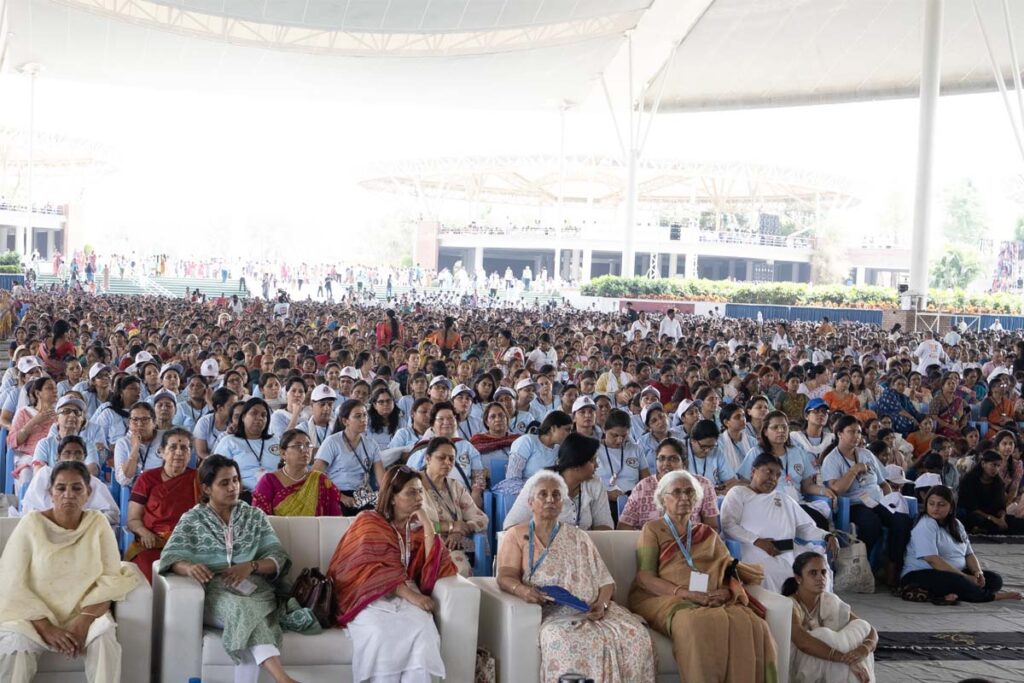
The second kind of knowledge comes from compassion. The empathetic knowledge of understanding the needs of others. What it is to understand the situation below the surface through compassion and through empathy.
An example of that by Amma. When the 2004 Indian Ocean Tsunami struck our Amritapuri Ashram, over a lakh (100,000) of people in that strip were dislocated. Their homes were washed away. They were all neck to waist deep in water and swimming across for safety. We evacuated 25,000 people to the mainland.
The first thing Amma did was make sure there was hot chai available for everybody who was moved. Why hot chai? It’s one of the first things that gives you some sense of comfort. Some sense of grounding yourself.
The second thing was that she made sure that the food prepared was fish. Why? Because they were fishing people. They were used to eating fish. We’re an Ashram, we don’t cook fish. But, we made sure that the food matched the tastes of the local people.
This is an empathetic understanding of what the needs of the people are. Amma also made sure that they all got glasses because they all lost their glasses. Again, now we know from science, that people who lose their vision or have lowered vision in the time of disasters, actually face a larger trauma than those with perfect vision.
Amma was motivated by compassion. She was not motivated by rebellion. She was not motivated by activism. She was not trying to right a social injustice. She was motivated by compassion. Compassion makes the essence of all our actions correct.
Prof Bhavani Rao
So small acts, micro acts of kindness, fuelled by the compassion that comes from an empathetic understanding of others. That is jnana shakti.
The third shakti is kriya shakti—the power of action. And the power of action should be altruistic. You have to have nishkama karma—you do not expect results from your actions. Make sure that your action is not tainted by the wrong kind of motivation, by selfishness. For compassion, it has no other type of motivation than its own.
And then the other essential attribute is that your actions should have shraddha—awareness. They should have resource efficiency. They should have no wastefulness. And they should be respectful. They should be respectful of the other.
I will tell you another story of Amma. Amma says that when you go to swim in a river or in the backwaters, the first thing that you will feel when you enter the waters is the urge to pee. But, the river is Devi. Amma always remembers that when she was a little girl, her mother, Damayanti Amma, told her that the river was the Goddess. If you remember that the river is Devi, immediately you will have the self-control not to pee.
The respect and the reverence to see everything as Divine will give you the strength and the self-control that you need to make sure that your actions are respectful, that your actions do not pull you down, that your actions do not perpetuate any kind of inequalities or any kind of oppression.
So it is in its sense the most fundamental value that you can define within Sanatana Dharma. The value of respect and reverence for all of Creation.


